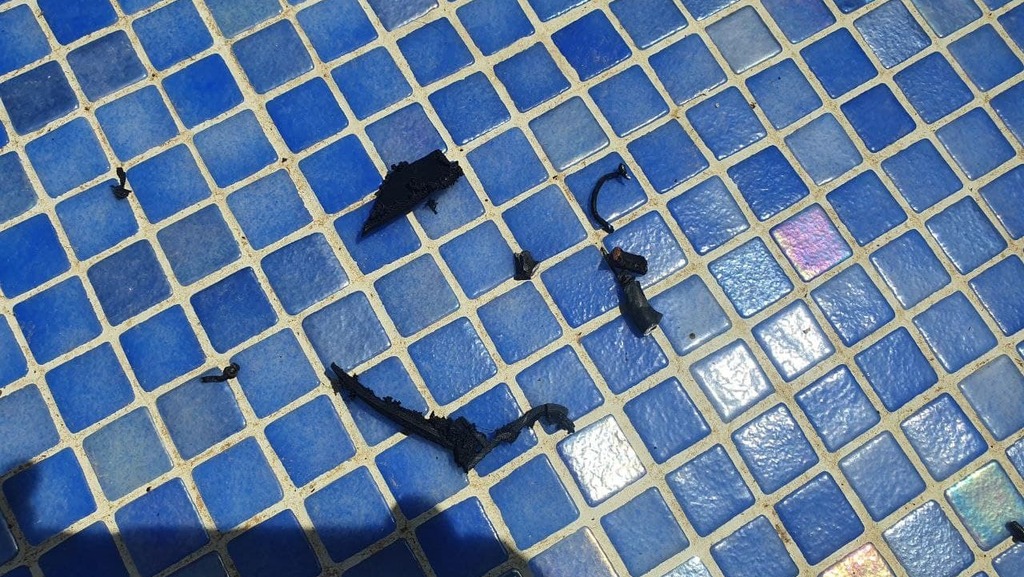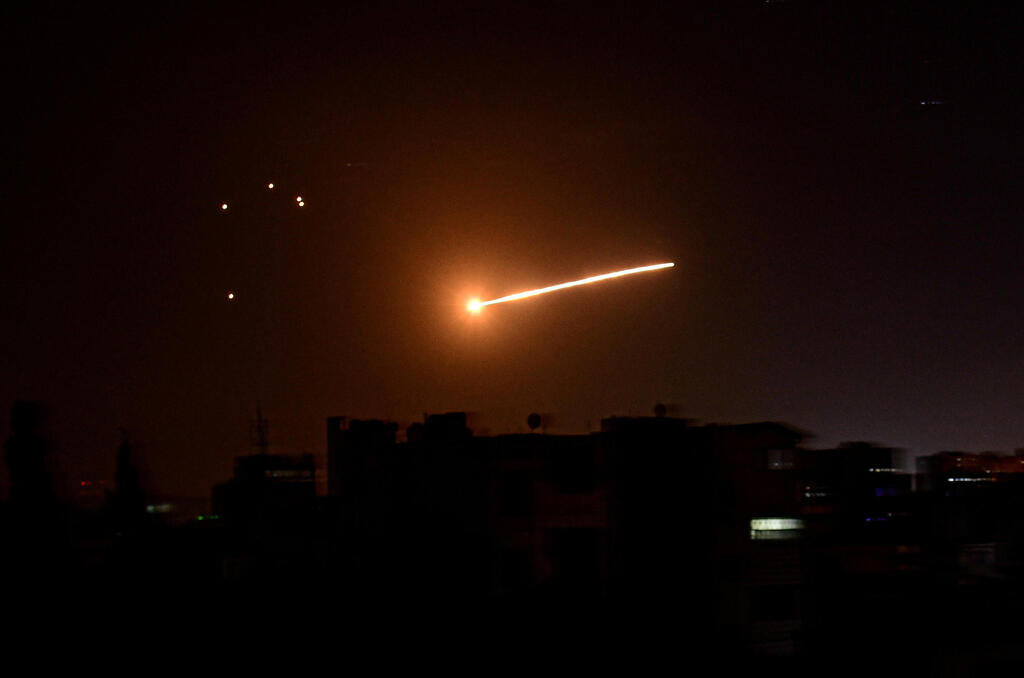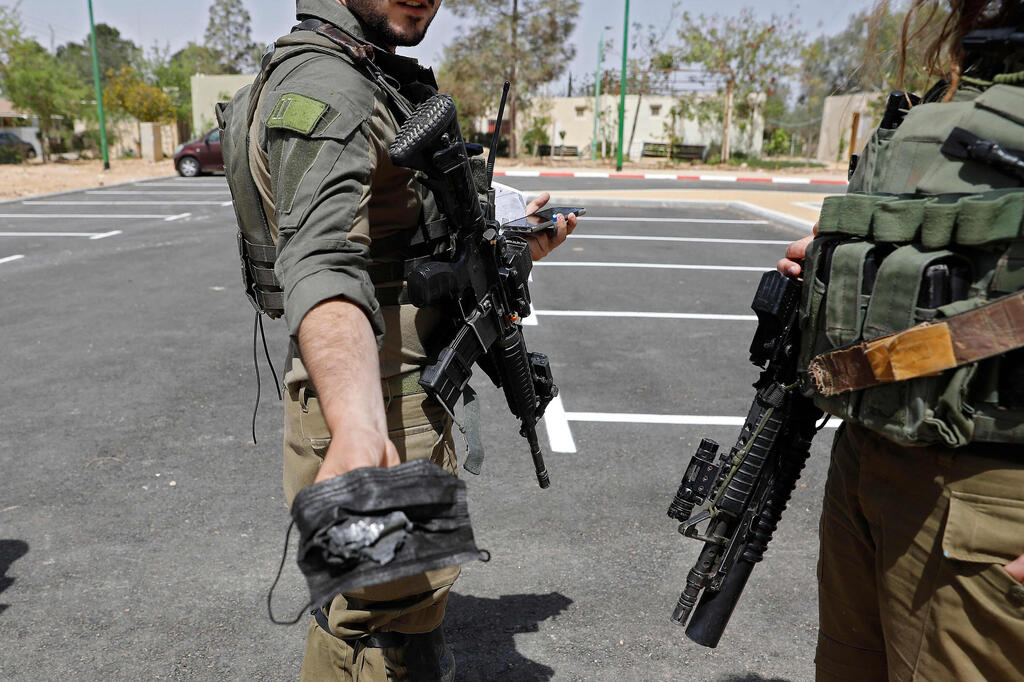Getting your Trinity Audio player ready...
Shrapnel from a Syrian missile that triggered sirens near Israel's nuclear reactor, fell on residential homes in the south after a mid-air explosion in the early hours of Thursday.
According to Israeli military, the SA-5 surface-to-air missile was fired by Syrian forces against Israeli aircraft overnight but overflew its target to reach the Dimona area, 200 km (125 miles) south of the Syrian border. The missile did not hit the reactor, landing some 30 km (19 miles) away.
4 View gallery


Shrapnel from the missile falls inside a pool of a residential home in Dimona
(Photo: Barel Efraim)
Shrapnel was also discovered inside a pool belonging to a residential house in Moshav Ashalim, about 35 km south of Be'er Sheva.
"It was around 2am when I heard a noise, a big blast," said Sonya Ravivo, the owner of the house.
"I waited for a little and went outside, but saw nothing. There were also no sirens or alerts, nothing. At 6am, my husband told me to come outside quickly - and we saw a large piece of a missile in our pool. We immediately called the police and the local council. A sapper arrived and we realized the [Syrian] rocket fell into our pool."
She said had the shrapnel land there at a different time of day, things could have ended far more tragically.
"I have three kids, they are out there all the time, my husband also works in the yard until the evening," she said.
"This is very scary. When security forces arrived, they said they found several pieces of the rocket, including a really heavy one made of steel. I ran away from there as quickly as possible before it exploded on us."
Another Dimona resident, Omer Ayed, said she wasn woke up in the middle of the night by the blast.
"I woke up from a very strong blast, while my phone was alerting me of a rocket attack near us," she said.
Rocket sirens going off at the IDF's Camp Ariel Sharon
Ayed said that she was very nervous and frightened, but did calm down after realizing what has happened. "On the one hand they say that it is nothing to be afraid of, but on the other - it was still a rocket explosion," she said.
Dimona Mayor Benny Biton asked the public to remain calm. "As you have heard from security officials, the rocket was not aimed at Dimona, but at another target and accidentally landed in our area. The city's residents can remain calm."
'Not an Iranian retaliation'
Maj. Gen. (ret.) Amos Yadlin, head of the Institute for National Security Studies and former head of the IDF's Military Intelligence Directorate, said he does not believe the rocket was "an Iranian retaliation" for recent sabotage at Iran's Natanz nuclear site, attributed to Israel.
"The region is very tense now, especially when it comes to Iran," he said, "As for connecting Natanz to Dimona - it is a very sensitive front due to the nuclear issue. That is why when we saw a rocket being launched towards Dimona, alarms started going off. But after learning what has actually happened, we understand that there is no connection, this is not a retaliatory action on Iran's part.
"This is an outdated rocket from the 80s, which the Syrians use from time to time against Israeli aircrafts," he added. "The missile is mostly used against cargo planes. This missile can travel for hundreds of kilometers, and if it misses its target and is not shot down by air defenses - it will fall within the range we saw tonight."
According to Yadlin, the important thing that happened early Thursday was the damage caused to Iranian weapons shipment into Syria in an airstrike attributed to Israel as a retaliation to the rocket launch.
"The air force is trying to convey a clear message to the Syrians - we are attacking the Iranians, not you. If you launch - you will get hurt," he said.
"This is why this night ended up with Iranians getting hurt, Syrians getting hurt and Israel being attacked with a single rocket."
4 View gallery


A streak of light is seen in the night sky in the vicinity of the Syrian capital Damascus during what Syrian authorities said was an Israeli airstrike
(Photo: Reuters)
Yadlin said he hoped that Israel's air defenses will investigate the incident, including whether the rocket should have been shot down.
"We need to understand that we do not have 100% air defense protection," he said. "Every system has a rate of success, 85%, 90%, and sometimes 95% in optimal conditions. Back when Israel was attacked with let say 20 rockets, one or two managed to slip through, but they still need to be very accurate in order to cause substantial damage. Again, the landing was in a sensitive location, but it is still far off from being a cause of concern."






